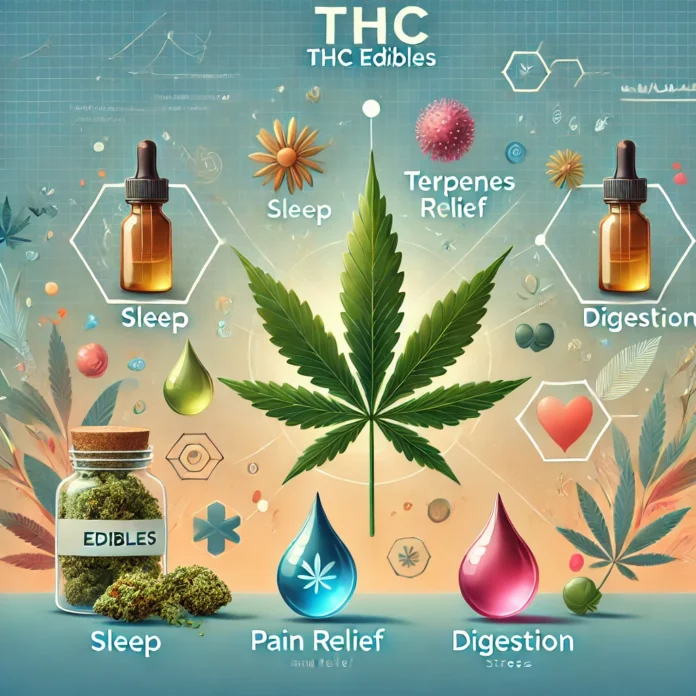The cannabis industry has come a long way in recent years, with THC edibles emerging as a discreet, flavorful, and effective way to enjoy the benefits of cannabis. While many associate THC with its psychoactive effects, there’s much more to this compound—and the plant it comes from. THC edibles, enriched with cannabinoids and terpenes, offer a range of health benefits that cater to both the body and mind.
This blog explores the top five health benefits of cannabinoids and terpenes found in THC edibles, how they work in harmony, and why they’re becoming a cornerstone of natural wellness.
Table of Contents
Understanding THC Edibles: What Are Cannabinoids and Terpenes?
To appreciate the health benefits of THC edibles, it’s essential to understand their main components: cannabinoids and terpenes.
Cannabinoids: The Building Blocks of Relief
Cannabinoids are chemical compounds found in cannabis plants that interact with the body’s endocannabinoid system (ECS). The ECS is a network of receptors that regulates various physiological processes, including mood, pain, appetite, and sleep. THC (tetrahydrocannabinol) and CBD (cannabidiol) are the most well-known cannabinoids, but there are over 100 others, each offering unique benefits.
- THC: Responsible for the “high,” THC also provides therapeutic effects such as pain relief, appetite stimulation, and stress reduction.
- CBD: A non-psychoactive cannabinoid that complements THC by reducing anxiety, inflammation, and neurotoxicity.
Terpenes: The Aromatic Enhancers
Terpenes are aromatic compounds that give cannabis its distinctive scents and flavors. Beyond their sensory appeal, terpenes also possess therapeutic properties. Each terpene works synergistically with cannabinoids, enhancing their effects—a phenomenon known as the “entourage effect.” Common terpenes include myrcene, limonene, pinene, and linalool.
Together, cannabinoids and terpenes create a powerful duo, making THC edibles a holistic health solution.
Benefit 1: Pain Relief and Anti-Inflammatory Effects
One of the most recognized benefits of THC edibles is their ability to alleviate pain and reduce inflammation. Chronic pain affects millions of people globally, often leading to a decreased quality of life. THC edibles offer a natural alternative to traditional painkillers, which can have severe side effects and addictive potential.
How Cannabinoids Relieve Pain
Cannabinoids interact with CB1 and CB2 receptors in the ECS:
- CB1 receptors: Found in the brain and nervous system, these receptors influence pain perception. THC binds to CB1 receptors, effectively “muting” pain signals.
- CB2 receptors: Found in immune cells, these receptors play a key role in reducing inflammation, with CBD acting as a potent anti-inflammatory agent.
The Role of Terpenes in Pain Management
Certain terpenes, such as beta-caryophyllene, amplify the pain-relieving effects of cannabinoids. Beta-caryophyllene interacts directly with CB2 receptors, enhancing their anti-inflammatory response. Myrcene, another common terpene, provides sedative effects, easing muscle tension and chronic discomfort.
Benefit 2: Enhanced Sleep Quality
Sleep disorders, including insomnia, affect millions of individuals and are often linked to stress, anxiety, or chronic pain. THC edibles are emerging as a natural alternative to prescription sleep aids, offering a two-pronged approach to improving sleep quality.
Cannabinoids and Sleep Regulation
- THC: In small to moderate doses, THC has a sedative effect that helps users fall asleep faster. It can also reduce the duration of REM sleep, potentially aiding those with nightmares or PTSD-related sleep disturbances.
- CBD: Reduces anxiety and promotes relaxation, creating the ideal conditions for restorative sleep.
Sleep-Enhancing Terpenes
Terpenes such as linalool and myrcene are particularly beneficial for sleep. Linalool, found in lavender, is widely recognized for its calming effects, while myrcene’s muscle-relaxing properties make it easier to achieve deep, uninterrupted rest.
For those battling chronic insomnia, THC edibles with a high concentration of these terpenes can serve as a game-changer.
Benefit 3: Anxiety and Stress Reduction
Modern life comes with its share of stressors, and anxiety disorders are more common than ever. THC edibles, when used responsibly, can provide a natural way to unwind and regain mental balance.
How THC and CBD Combat Stress
- THC: Promotes the release of dopamine, the brain’s “feel-good” neurotransmitter. This creates feelings of euphoria, helping users break free from the cycle of stress.
- CBD: Acts on serotonin receptors, reducing overactivity in the amygdala (the brain’s fear and stress center) and promoting a sense of calm.
Stress-Relieving Terpenes
Terpenes like limonene and pinene are particularly effective in reducing stress. Limonene, with its citrusy aroma, lifts the mood and provides a burst of positivity. Pinene, on the other hand, enhances focus and clarity while mitigating the paranoia sometimes associated with high doses of THC.
Benefit 4: Improved Appetite and Digestive Health
For individuals dealing with appetite loss or gastrointestinal issues, THC edibles offer a discreet and effective solution. This benefit is particularly significant for those undergoing treatments like chemotherapy or managing conditions such as Crohn’s disease.
THC’s Role in Appetite Stimulation
THC stimulates the release of ghrelin, a hormone that signals hunger to the brain. Known as “the munchies,” this effect can be life-changing for individuals who struggle with maintaining a healthy diet due to a lack of appetite.
Terpenes Supporting Digestive Wellness
Terpenes such as beta-caryophyllene and limonene enhance the digestive benefits of THC. Limonene reduces acid reflux and improves gut motility, while beta-caryophyllene offers anti-inflammatory benefits for conditions like irritable bowel syndrome (IBS).
By incorporating THC edibles into their routine, individuals can enjoy improved digestion and a renewed interest in nourishing their bodies.
Benefit 5: Neuroprotective Properties and Cognitive Support
Cannabinoids and terpenes are also gaining attention for their potential to protect brain health and support cognitive function. This makes THC edibles a promising option for individuals at risk of neurodegenerative diseases or those seeking to enhance mental clarity.
Cannabinoids as Brain Protectors
Cannabinoids like THC and CBD show promise in combating neuroinflammation and oxidative stress, both of which contribute to conditions like Alzheimer’s and Parkinson’s disease. These compounds interact with ECS receptors to regulate brain activity, improve mood, and potentially slow cognitive decline.
Cognitive Benefits of Terpenes
Certain terpenes, such as pinene, counteract memory loss and improve mental focus. Pinene’s ability to enhance oxygen flow to the brain makes it a valuable addition to THC edibles for those looking to boost cognitive performance.
Maximizing the Benefits of THC Edibles
To experience the full range of health benefits, choosing the right THC edibles is crucial. Here’s what to consider:
- Choose Full-Spectrum Products: Full-spectrum THC edibles contain a variety of cannabinoids and terpenes, offering enhanced therapeutic effects compared to isolate products.
- Understand the Terpene Profile: Look for edibles with specific terpenes that align with your health needs, such as linalool for sleep or limonene for stress relief.
- Start Low and Go Slow: If you’re new to THC edibles, begin with a low dose and gradually increase as needed to find your optimal dosage.
Potential Considerations and Risks
While THC edibles offer numerous health benefits, they’re not without potential drawbacks:
- Delayed Onset: Edibles take longer to kick in compared to smoking or vaping, leading some users to consume more than intended.
- Dosage Sensitivity: High doses of THC can cause anxiety, paranoia, or drowsiness. It’s important to start with a low dose, especially for beginners.
- Legal Considerations: Ensure THC edibles are legal in your jurisdiction and purchase from reputable sources to guarantee quality and safety.
Conclusion
The cannabinoids and terpenes in THC edibles go far beyond recreational use, offering a wide array of health benefits. From pain relief and better sleep to anxiety reduction and neuroprotection, these compounds are transforming how we approach wellness. By harnessing the synergy of cannabinoids and terpenes, THC edibles provide a natural, effective way to support both physical and mental health.
As research into cannabis continues to grow, the future looks bright for those seeking plant-based alternatives to traditional medicine. Whether you’re new to THC edibles or a seasoned consumer, understanding their therapeutic potential can help you make informed decisions and unlock a healthier, more balanced lifestyle.
Apart from that if you want to know about “Exploring the Variety of Carrier Oils for Beauty Regimens” then please visit our “Health” Category.























